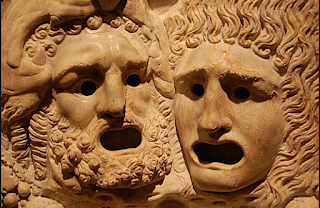Did we get the concept of 'Sin' wrong all along
Estimated read time | 3 min
Heart Pounding Guilt or the Key to Mentalism?
Within the dogmatic beliefs
related to most Abrahamic interpretations of the ancient scriptures we can find
a strong cultural attachment to an ancient patriarchal society, the values of
reward and punishment along with a war-like attitude towards life.
It is very likely that these
Abrahamic religions added themes of their own culture to the most popular scriptures
in circulation, if we take into account the fact that the Roman culture adopted
Christianity and later on, Christianity was the foundation for the Medieval
Kingdoms it might not be such a surprise how Christianity ended up with a
religion where full obedience is to be set on a patriarchal ‘God’ and any
trespass on -his- rules could have the individual deemed as a ‘Sinner’ and sent
to the depths of Hell, eternal punishment, even in the case of petty rules like
not paying 10% in tithe to the church or even more banal things like eating pork.
Perhaps there's more to 'Sin' than we think.
Divine Encounter or Active Imagination? Both?
To this day a large segment
of the current population abides to rules which make little sense to even
themselves; yet events, figures and documented evidence which changed history
in its tracks have got to have more consistency than the petty medieval rules
created by fearful kings whose main concern was keeping the crown.
Moreover, there is little
evidence in the scriptures of such petty rules coming from key figures in the actual
scriptures, it’s been addressed in this -Outline-, how it is very likely that
the figure of Moses added his own culture and personal beliefs to what could
have been an ASC (Altered State of Consciousness) experience, involving perhaps
an encounter with a NHI (Non-Human Intelligence).
However, the 10 Commandments include
rules for social cohesion and progressive development, something that has
become a pattern in many ASC experiences where the subjects often meet with
‘entities’ which suggest personal or social development, ideas of a cosmic consciousness
instead of hellish visions for trespassing petty patriarchal rules attached to particular cultures.
The Devil’s in the Details
In the case of Jesus and the New
Testament we have more conclusive evidence about these misinterpretations, there
is some debate about the language of the -canonical gospels-, as to whether
they were originally written in Greek or translated to it, either case there
has been little discussion on the word used for ‘Sin’ in these documents, in
part since all the way to the late medieval periods people wouldn’t read the
scriptures themselves, they rather based their lives and beliefs on the
interpretation of a priest.
The word for ‘Sin’ in Greek is-Hamartia-, to miss the mark to err, which is tied to a concept created by the
early Greek tragedies when the actions of a play character turned the plot into
such tragedy, a series of events which led them into that.
This concept of ‘Sin’ is miles away from the heart pounding, God fearing, submissive belief of ‘Sin’ that our current dogmatic ideologies espouse today, this has sparked debate from modern people who have immediate access to information.
Patriarch or Misunderstood Magician?
Everything that the figure of
Jesus mentioned about ‘Sin’ in the scriptures came as some sort of cryptic
understanding, perhaps a more advanced way of thinking which could be tied to
modern theories of NLP or more esoteric versions of this very theory which we
could define today as ‘new age’ or even ‘mentalism’ as explained in the
-Outline-.
Studying the early Jesus, the
direct quotes and ideas, reading the scriptures in their original language is more aching to studying a magician, a modern theorist
of the holographic universe who believed our thoughts can affect our lives, an
esoteric and a metaphysical sage more than that strict, patriarchal, punitive
‘God’ that still our current dogmas try to push forward.
More on 'Sin' and Mentalism ...


